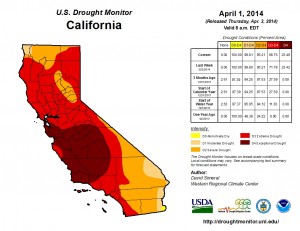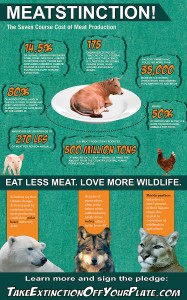Using up the Earth: What to do about Consumption?
Apr 4th, 2014 | By admin | Category: Consumption and Waste, FeaturedBy Suzanne York, www.howmany.org
The world is consuming resources at an unsustainable rate. Reducing consumption is a sensitive and difficult subject to broach, but one that must take place if we want to keep a livable planet for future generations.
It doesn’t have to be “all or nothing” or a call to return to a simple life of living off the land. There are things that we can do to ease human impact on the environment and actually improve our lives and well-being at the same time. Here is a brief look at some ways to reduce consumption.
Invest in Conservation and Efficiency
In a world of finite and scarce natural resources, there is no excuse for not encouraging and implementing policies on conservation and greater efficiency. Take water, for example, and the state of California. According to the U.S. Drought Monitor, nearly 99.8 percent of the state is in drought (with 23 percent in exceptional drought).
As reported by Bloomberg News, based on a study from the University of California, Los Angeles, the drought has prompted such wide adoption of conservation methods that the current water shortage will have little impact on the state economy.
That is partly because due to past droughts, the state has promoted drip irrigation in agriculture, the usage of less water-intensive household appliances, water recycling, and storm water reclamation. Other initiatives include rainwater harvesting, native landscaping and incentivizing conservation (i.e., pricing water).
Also, rethinking continual growth of water-challenged cities might be in order. Over 24 million people live in southern California, the land of cars, laws, and swimming pools.
Changing Mindsets
Beyond rethinking where and how people live, there is a call to rethink how economies are structured – namely using economic indicators that account for human well-being and healthy ecosystems. Former French president Nicholas Sarkozy and Joseph Stiglitz, former chief economist for the World Bank, are just a few prominent proponents calling for new indicators.
Then there is the advertising industry (worth untold billions), which sways many people into having to have the latest and greatest gadgets. Curbing consumption really comes down to stopping mindless consumerism, where people buy things they don’t even need, and even go into debt buying. Almost as bad is the planned obsolescence of too many products; not that long ago items were made to last, but that is not the case for most things today.Economist Tim Jackson once said that “we spend money we don’t have, on things we don’t need, to create impressions that won’t last, on things we don’t care about.” Who knows, maybe an advertising-free world could be a refreshing experience?
The Meat of the Matter
The concept of “meatless Monday” goes beyond reducing consumption of meat for one’s health; it can also result in reduced carbon emissions. The Food & Agriculture Organization reported greenhouse gas emissions from livestock accounted for approximately 14.5% of total U.S. greenhouse gas emissions.
The Center for Biological Diversity (CBD) just launched a campaign on meat reduction as one path towards healthier communities. Stephanie Feldstein, Population and Sustainability Director for CBD, states why this important :
The livestock industry takes a devastating toll on wildlife, habitat and the climate, and as population and demand for meat increase, it’s only going to get worse. There are simply too many people eating too much meat. Choosing to reduce your meat consumption is a powerful way to reduce your environmental footprint and save wildlife.
Powerful, and an easy thing to do. Note that CBD is calling for “reducing” meat consumption, not eliminating it. Imagine the impact of giving up meat just 2 or 3 days a week.
Complexity of Consumption
Inequity, inequality and globalization are also part of resource consumption. Certainly the rich consume much more than the poor. But still, all consume resources. Annie Leonard of the Story of Stuff has said that “Instead of growing the pie, we need to ensure that none of the pie is wasted, freeing up resources that then could be divided more equally.”
Perhaps the most important point is to realize that people share the planet with nature, and it does not exist for human use alone. Human arrogance has got us into this mess. It is time to acknowledge the importance of nature and the price of our actions on Earth; consuming less and smarter is one way forward to a better future.
Suzanne York is a senior writer with the Institute for Population Studies.



